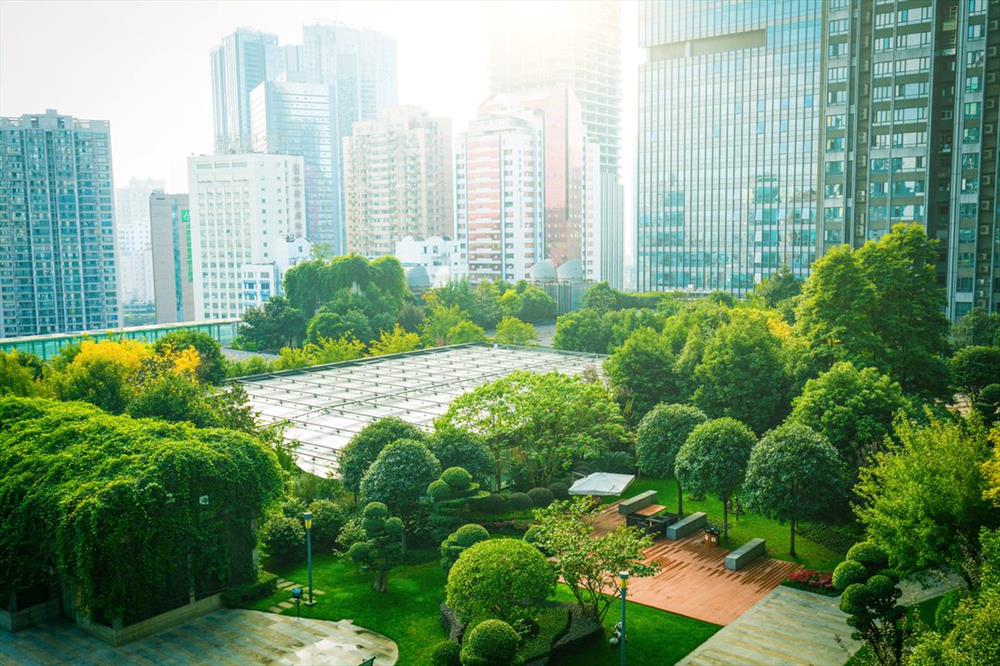The “modern city” is a catalyst for development due to the level of human activity within its bounds. The city is interconnected with every other factor, including demography, technology, economy, environment, political changes, etc., and as such, is also affected by any fluctuation. This is a challenge to creating sustainable, safe, and liveable cities at present.
The Sustainable Development Goals (SDGs), agreed upon by all member nations of the United Nations in 2015, dedicate Goal 11 to making cities more inclusive, safe, resilient, and sustainable. A sustainable city is one that could cater to the needs of its inhabitants towards ensuring a comfortable living environment. Public services, rapid and clean transportation networks, adequate housing facilities, intelligent urban fittings, well-maintained public open spaces, urban forests, productive use of waste, and strategies for reducing carbon emissions are some of the main features of a sustainable city.
In Sri Lanka, 18.2% of the population comprises urban dwellers, according to the Census of Population and Housing in 2012. According to research done by the University of Moratuwa, it is predicted that 65% of the population in Sri Lanka will live in urban areas by 2030.
This rapid urbanisation can be explained by people’s desire to consume more, try smarter services, reduce commuting expenses, improve quality of life, and more importantly, to uplift their social status. However, urban migration creates massive accommodation demands in addition to increasing traffic congestion, high urban density, solid waste generation, overuse of non-renewable resources, environmental pollution, social inequality, etc.
City planning can be modernised and better streamlined to meet the contemporary challenges associated with rapid urbanisation. The National Physical Planning Policy and Plan 2017-2050 has identified green built environments, urban forests, and open spaces as essentials for sustainable development within urban areas.
“Green Building” approaches have been identified as vital for sustainable development in the context of rapid urbanisation. Increasing demand for urban housing has resulted in skyscrapers and vertical developments across Sri Lanka. Research conducted by the Central Engineering Consultancy Bureau with the University of Peradeniya, found that applying the “Green Building” concept can result in a reduction of carbon emissions by 35%, solid waste by 70%, water usage by 40%, and energy usage by 50%.
Any building can be developed as a “Green Building”, whether a home, office, hotel, school, shop, etc. Renewable energy usage, solar photovoltaic (PV) installation, and efficient lighting systems are common approaches towards greening buildings. A transformation towards renewable energy is also a key priority outlined in the national policy framework, “Vistas of Prosperity and Splendour”.
Water harvesting, and on-site waste and waste water management using recycle or reuse policies, are also important ways of “greening buildings”. Minimisation and segregation of waste are basic steps in waste management that we can easily adopt and practice.
Some robust initiatives have been proposed under the “Vistas of Prosperity and Splendour” towards “greening of cities”. The existing linear economy that produces goods using raw materials, disposing waste into the environment, is proposed to be transformed into a circular economy, where the waste of one industry could be used as inputs in another industry. This is a practical way of using the 3R (reduce, recycle, reuse) concept of waste management.
Urban forests, green paths, and agroforestry are proposed to be established to control air pollution, while promoting vertical green developments for settlements. The strategic urban planning initiatives to be taken by the Government aim at promoting sustainable urban development. We, as citizens, have a duty to build a sustainable future by sharing responsibilities towards creating sustainable cities.
(The writer is a Sustainable Development Officer of the Sustainable Development Council of Sri Lanka)
(Aruna)

